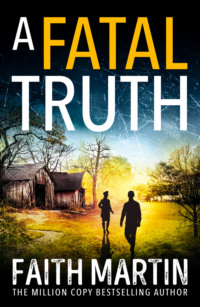
Полная версия
Naturally, Trudy had thought when she’d first read this, you’d expect them to say that. Nobody, after all, liked to think they might have missed the signs, and thus feel culpable for letting down a loved one.
However, against that, Gisela had been treated for depression for years before her death, and several of her friends testified that she could be ‘difficult’, describing her as ‘being up one minute and down the next’. There had been some hints, too, that she could be ‘highly strung’ at times.
It was also noted that the victim had recently broken up with her boyfriend of six months or so, one Mr Jonathan McGillicuddy. Although their courtship had been over for several months, many of her friends reported that it had affected her badly, leaving her ‘wild with anger’ or, alternatively, ‘weepy and distraught’.
But all her friends agreed that Gisela herself had been adamant they would eventually get back together. It was also agreed among her friends that the breakup of her courtship with McGillicuddy, a young widower with a small child, had made her, if anything, angry rather than suicidal. One friend had even testified that Gisela was so determined to win him back that she was making plans for an engagement party.
Which perhaps indicated the thinking of someone unstable enough to swallow a whole bunch of pills?
But there had been nothing concrete for the jury to latch on to, and it wasn’t really surprising that they might have been reluctant to bring in a verdict of suicide on such skimpy and mostly hearsay evidence.
Not that, in the event, this had proved to be a problem for them, because everything had changed with the mother’s testimony. Indeed, it had been Beatrice Fleet-Wright who had been instrumental in their bringing in the verdict they did – death by misadventure.
Gisela, like a lot of people suffering with depression and a vague, unspecified, so-called ‘mental illness’, hated taking the drugs prescribed for her by doctor. Often she complained that they left her feeling tired or sluggish, and as if she was ‘watching the world through a pane of glass that had been smeared with grease’. Not surprisingly then, she often tried to get out of taking them, swearing she’d swallowed the prescribed dose when, in actuality, she hadn’t. And the fact that her family could tell when this was the case proved just how much she needed them to keep her depression and mood swings at bay.
So her mother, and sometimes her father, had taken to standing over her and making sure she took them in the morning, at noon and in the early evening, as prescribed.
Unfortunately, Beatrice Fleet-Wright (often described in the court transcripts as ‘weeping’ or ‘clearly distraught’) had once or twice caught her daughter being sick in the bathroom, and suspected she was deliberately making herself ill shortly after taking the pills in order to prevent them taking effect.
This could lead to some confusion, she had testified – a number of times, she’d had to make sure her daughter took some more pills and then kept them down. And very often, she further testified, her daughter would take a short nap after taking the pills, as they made her drowsy, and, on waking, could be ‘somewhat confused’ and ‘wildly unpredictable’ for a short while, until she seemed to ‘balance herself out’. During these bouts, she could become forgetful, playful, morose or angry, depending on her state of mind at the time, and thus could forget she’d already taken the prescribed dose, leading her to take them again.
As her evidence went on, it became clear that Beatrice Fleet-Wright was convinced the overdose had been accidental.
She’d testified that, on the morning in question, her daughter, a third-year student at a local non-affiliated college, studying for a BA in English literature, had promised her she’d taken her pills, but that she, her mother, hadn’t believed her. She’d said that, when her daughter had promised her this, she’d shot a guilty look at the bathroom, causing Beatrice to suspect she’d brought them back up again.
So she had given her daughter a second dose, just to be sure. This, of course, wouldn’t have been anything like enough to kill her, even if she’d been mistaken and Gisela had, in fact, taken the dose she’d said she had.
When she’d left Gisela alone in her bedroom, her daughter had been taking a nap, sleeping peacefully, as was usual.
But what, Beatrice had speculated, if Gisela had then woken up in a confused state and, not realising she’d already taken her pills, decided to take some more? Sometimes, on waking, she could be in a slightly tearful and contrite state, and would apologise to her mother, or father, or anyone else present, vowing she would ‘try to be good’ and take her pills. And, sometimes, she had seemed childishly keen to do so.
What if that had happened this time?
If Gisela hadn’t, in fact, regurgitated her first set of pills, she would have had two doses inside her, making her even more confused. If she’d then woken up in a ‘contrite’ state of mind, she might have taken yet a third dose. And, since it might have been close to lunchtime when she woke up, might she then have taken her ‘second’ dose of the day, which would in effect have been a fourth or fifth?
At this point in her testimony, Mrs Fleet-Wright had become ‘inconsolable’ as she admitted she must be responsible for her daughter’s death, telling the court she blamed herself for not being right there, in her daughter’s bedroom, at the fatal moment. For even though she’d been due to attend a meeting that afternoon, discussing an up-coming charity event with her fellow WI members, she’d cancelled it at the last moment and had remained in the house, but doing odd little jobs of housekeeping throughout her home instead.
The coroner had told her she mustn’t ‘speculate’ about what had happened and ‘stick only to the facts’, but nothing he said could convince the witness she wasn’t responsible for her daughter’s overdose.
Distraught, and still blaming herself, Mrs Fleet-Wright had been led from the witness stand.
After that, things had moved along fairly crisply, with both the jury and coroner in agreement. It was found that Gisela Fleet-Wright had died after accidentally taking too much of her medication, and a verdict of death by misadventure had been duly entered into the records.
Now, nearly five years later, as Trudy tidied up her desk and got ready to call it a day, she felt her heart ache for that poor girl’s mother. To lose a daughter at all was surely tragic enough – but to have to live the rest of your life feeling and believing you were to blame (and who knew, perhaps she actually was?) must be awful.
As she walked down St Ebbes, she paused to look in the brightly lit shop window of Coopers, one of her mother’s favourite stores, but found little in the window display to attract her attention.
Just what was it about the Fleet-Wright case that had got Dr Clement Ryder so worked up? She was fairly sure, at least, that the fact of their murder victim knowing the dead girl could have no possible bearing on his murder all these years later. Clearly the old vulture was merely using the coincidence to get his own way in re-examining the dead girl’s case!
CHAPTER FOURTEEN
The next morning found Sir Marcus Deering sitting in his study, in his usual chair, staring in numb disbelief at the envelope in his hand. His secretary, after delivering it, had backed out quickly as he barked at her to telephone the police at once.
He sat for several frozen seconds, simply staring at the familiar, green-inked block capitals, then found his hand was shaking so much that he couldn’t actually physically manage to open it. His fingers felt like so many numb sausages. In the end he stopped trying and simply dropped the thing onto the top of his desk.
He told himself he should probably leave it alone anyway. The police should be the ones to open it, obviously, in case of fingerprints or clues, or something.
Swallowing back a sudden rush of nausea, he turned in his swivel chair and surveyed the garden through the window. But in January there was little out there to distract his eye, and inevitably, as they so often did now, his thoughts turned to Jonathan. The son he’d never acknowledged. Had never, in fact, even met. And whose dead body now lay in the city morgue.
When Mavis had told him she was pregnant, he’d been relieved to let his father take care of it all, hushing up any scandal and paying her an allowance that would allow her to bring up his grandson in a reasonable manner.
Mavis had been unhappy, of course, as was her family, but in the end they came to see it was for the best. Marcus hadn’t even started university, and it was clear he was too young to take on the responsibilities of fatherhood.
As the years went by, although Mavis had offered him plenty of chances to get to know his son, he’d never felt the urge to take her up on them. And once he’d made such a good marriage, and Martha had presented him, first, with Anthony and then, a couple of years later, with Hermione, it had become even more unthinkable that he would play any part in the boy’s life. After all, Martha knew nothing about his past indiscretion, and for Anthony and Hermione to suddenly be presented with an older sibling – a cuckoo in the nest – was out of the question.
Besides, the boy was loved and cared for. Mavis had kept him informed of his progress – his marriage, the birth of his daughter, the loss of his wife, and the setting up of his own gardening business.
And if, in the back of his mind, he’d sometimes fantasised about meeting the boy, or perhaps just watching him walk down the street, well…
Well, that could never happen now, could it?
Wordlessly, Sir Marcus Deering began to weep; big, fat, desolate tears that rolled down his cheeks unnoticed.
He was dry-eyed and in control of himself, however, when Sergeant O’Grady arrived a short while later and, wearing gloves, carefully opened the letter, preserving the evidence in a plastic bag.
The message had been short, clear and unequivocal.
Unless Marcus Deering did the right thing, his other son would also die.
And it was then that the businessman finally had to acknowledge that the nightmare wasn’t over yet – not by a long chalk.
‘Well, come in and sit down,’ Clement Ryder said flatly. ‘I don’t bite.’
‘Good job you don’t, sir,’ Trudy said smartly. ‘That would constitute assaulting a police officer and I’d be obliged to handcuff and arrest you.’
For a second, the coroner stared at her. Then, unbelievably, he shot her a quick flash of his teeth – which she took to be a smile – and nodded.
‘Good. At least you’ve got some gumption,’ he congratulated her. ‘I was worried Jennings had fobbed me off with the office idiot.’ He paused and looked at her closely. ‘Do you have any A-levels? How old are you?’
Trudy flushed. ‘I’m nineteen, sir,’ she said flatly. ‘And I have eight O-levels and two A-levels.’
‘Science?’
‘English and history.’
‘Oh, well. That’s better than nothing, I suppose,’ he muttered.
Trudy flashed her own teeth at him. He could take it for a smile or not, as he pleased.
The old man grunted, but from the flash of his eyes and slight twist of his lip, Trudy guessed, with some relief, that he’d been rather pleased with her responses.
Which was just as well, for, when contemplating the task that lay ahead of her, it had occurred to her that perhaps appeasement wasn’t the way to go when dealing with a strong-minded character such as Dr Ryder. And although he was certainly an important man who expected obedience and respect, the sooner he acknowledged she wasn’t going to be ridden roughshod over, the better.
‘So, you’ve had a chance to read the Fleet-Wright file?’ he said briskly. ‘What do you make of it? And sit down, girl – you’re beginning to give me a crick in the neck.’
Trudy, who had been unknowingly standing at attention, quickly hooked a large, comfortable-looking, black-leather chair and sat down.
She was dressed in her crisp, neat uniform, complete with hard-peaked cap, and in the leather satchel thrown over her shoulder she had her full set of accoutrements. From this satchel she now drew out her own notebook, where she’d jotted down the salient points, and the copy of the file.
As she handed the latter document back, she cast a quick look around his office, which was definitely one up on the offices back at the station, that was for sure! Large landscape paintings hung on walls that had been painted soft beige, and a fire roared away in the fireplace. On top of the large mantelpiece were ranged a number of brass, art deco-style ornaments. The coroner’s large, leather-topped desk dominated the room, and a number of bookshelves, crammed with law, medicine and history tomes, gave the room the feeling of a library in an exclusive gentlemen’s club.
‘Be glad when they get some damned central heating in this place,’ Clement grumbled, glancing behind him at the large windows giving a view out onto what looked to be an old, cobbled courtyard. And even Trudy, who was seated further away from the panes of old glass, could feel a distinct chill coming from them. It didn’t help that, once again, the weather outside was cold, wet and windy.
Trudy took a deep breath. ‘Well, sir,’ she began firmly, trying not to sound as nervous as she felt, ‘it seems to me that, given the evidence, both the jury and coroner arrived at the only verdict possible. Death by misadventure.’
She looked up from her notebook, waiting for him to lambaste her. Reminding herself of her promise not to let herself be cowed, she watched him steadfastly.
When old Walter had heard she’d been seconded to work with Ryder, he’d filled her in rather gleefully on yet more tales of how the old vulture had tripped up many a copper on the witness stand. And had once made such a pest of himself that the Chief Constable had even contemplated taking early retirement.
Even the Sergeant had warned her that the old man, though ‘sharp as a tack’, could be a bit irascible, and that she was to take no nonsense from him. So, considering the man had such a reputation for not suffering fools gladly, she half-expected to feel the knife-edge of his temper right away.
Instead of berating her for not agreeing with his contention that there was something wrong about the case, however, she found him watching her thoughtfully instead, and even nodding slightly.
‘Yes. From the evidence presented, the jury couldn’t really come up with anything else, could they?’ he said mildly, instantly making her doubt she’d heard him properly.
‘You’re agreeing with me?’ she heard herself say stupidly. Then felt herself flush. ‘I’m sorry, Dr Clement, but I’m rather confused. I understood…that is, DI Jennings told me you weren’t happy with the verdict. That, in fact, I’m supposed to help you re-examine the case?’
‘You are.’
Trudy blinked.
The coroner was dressed in his trademark dark suit, with a tie that she suspected either represented his specific Oxford college, or maybe some equally high-up medical establishment. His abundant silver hair was neatly brushed, and his watery-looking grey eyes were as sharp as ever. He didn’t look like somebody who was either losing his marbles or liked to indulge in word games.
Nevertheless, she definitely felt as if he was messing her about, and her own gaze hardened. ‘Perhaps it would simply save us some time and effort, sir, if you were to tell me exactly what it is you’d like us to do?’
Clement Ryder smiled faintly. ‘A decisive woman of action. Very well, WPC Loveday,’ he said briskly. ‘I want us to question the witnesses who testified at Gisela Fleet-Wright’s inquest, and re-examine the evidence in the cold light of day nearly five years later. And to perhaps start with your newest murder victim, Jonathan McGillicuddy.’
‘But why, sir? Mr McGillicuddy, according to the transcripts, gave only a very short witness statement. He simply said, in effect, that he and Gisela had been “going steady” for a while, but that they had broken it off. And that he hadn’t been in contact with her for weeks before she died.’
‘That’s what he said, yes,’ Clement Ryder agreed mildly.
‘And you think he was lying?’
‘He certainly wasn’t telling the whole truth.’
Trudy slowly leaned back in her chair. ‘Do you have any evidence of this, sir?’
‘Of course I don’t,’ Clement said testily. ‘If I did, I wouldn’t need you to find it for me, would I?’ But as Trudy flushed – either in anger or embarrassment – he swept on before she had a chance to protest. ‘But he’s not the only one who lied. And since the man is dead, we can’t actually ask him why he did, can we? So we’ll need to start with a living witness who might know, and his mother is the obvious starting point for that.’
Trudy took another long, deep breath. Instinct was telling her she needed to keep her wits about her with this man, and that once she’d let him bamboozle her, it would set the pattern forever. So she’d damned well better make sure it didn’t happen.
‘Not quite so fast, sir, if you please,’ she said smartly, but with a brief smile. ‘Who else do you believe lied on the witness stand?’
Clement Ryder gave a brief, ironic grunt. ‘Who lied? It would be easier to say who didn’t!’ He leaned back in his chair and sighed. ‘Apart from the expert witnesses – and, I think, the two gardeners who were called to testify that they hadn’t seen any strangers hanging around – they all had something to hide. At the very least, some of them were fudging it. And the more brazen of them were telling downright lies in an attempt to pervert the course of justice.’
Trudy felt her jaw starting to drop at this arrogant, sweeping statement, and quickly clamped her teeth together. She noticed that the older man was watching her with some amusement now, probably well aware she was only holding on to her temper with a bit of an effort, and again she felt a telltale flush of repressed temper cross her cheeks.
She really wished she could get out of this childish habit of colouring up whenever she felt angry or disconcerted.
‘All of them, sir?’ she said mildly, but allowing her tone to sound downright sceptical. ‘You’re saying they were all lying? The girl’s father?’
‘Him, certainly.’
‘Her mother?’
‘Her especially.’
‘And, as you say, our murder victim. What about her friends who testified as to her temperament and state of mind?’ she asked sardonically. ‘Did the conspiracy of lies extend to them as well?’
Totally ignoring her sarcasm, Dr Ryder shook his head. ‘No, not them so much,’ he admitted airily. ‘I think they tried to be as honest as they could, given the circumstances. Of course, they were all rather reluctant to speak ill of the dead, but that’s a common enough phenomenon. The point is, I don’t think any of them was trying to be deliberately obstructive. And they certainly painted a clear and honest picture of the victim, who had been a rather brittle and self-destructive character.’
Trudy, for the moment, was willing to let the old vulture’s rather outlandish statements stand, because now he’d come to something that had struck her too. On reading through the file for the fourth and final time last night, what had made the most lasting impression of all on her was the character of the dead girl.
Although the medical witnesses had talked of her depression and mood swings in medical lingo, and her parents, naturally, had talked of her as a loving daughter with distressing mental issues, what had come across to Trudy was the sheer instability of the girl.
One moment Gisela had been up, the next down. One minute contrite, the next manipulative. One moment she was sure she was going to win back her former boyfriend, the next she was roundly ranting about him and blaming him for all her woes. But underneath it all, she’d sensed that Gisela Fleet-Wright had been a volatile, perhaps spoilt girl; one who was used to getting her own way, and didn’t like it when she didn’t. A bright girl – her university place had shown that – and, from the photographs of her, a very beautiful one too. And beautiful girls, as Trudy had often observed, were very good at getting what they wanted.
And Gisela, like a child who probably hadn’t grown up, had thrown tantrums when thwarted.
Another thing that had stood out, in Trudy’s mind at least, was Gisela’s obvious obsession with their latest murder victim. Whether Jonathan had been the one to end the relationship, as most people believed, or whether Gisela had in fact ended it (as she had insisted to all her friends she had), everyone was in agreement that the dead girl had been totally besotted with Jonathan McGillicuddy. Either with winning him back, or paying him back, depending on her mood of the moment.
Trudy quickly flipped through the file and picked out a photograph of the dead girl, taken barely a month before she died. About five-feet-eight or so, she’d had lovely long dark hair and vivid green eyes in a heart-shaped face. Almost too slender, she had an elfin rather than voluptuous beauty, and even if she hadn’t already been aware of the girl’s ultimate fate, Trudy would have said she had a fragile look about her. The sort of girl who could pose for a pre-Raphaelite painting of some tragic maiden, doomed to die of love.
‘You think she was a bit of a madam?’ was what Trudy found herself actually saying. And again, saw the coroner give her a swift and approving look.
Which, in turn, made her feel rather pleased with herself.
‘I think that’s a pretty good description, yes,’ he agreed wryly.
Instantly forcing the warm, fuzzy feeling his approbation had given her to one side, she looked across at him flatly. ‘And do you think her personality had anything to do with what happened to her?’
‘Our personalities always affect our lives,’ Clement said, and there was some echo of sadness in his voice that puzzled her. ‘How can it not?’
Clearly, this man had known pain and regret, she thought fleetingly.
Then his eyes sharpened on her once again, and any desire to feel pity for the man instantly fled. It would be a poor fool indeed, Trudy thought in that moment, who offered tea and unwanted sympathy to Dr Clement Ryder.
‘What I intend to find out is how and why that young woman died,’ he said crisply. ‘Because I’m damned certain that what we heard at the inquest was a carefully edited version at best, and a damned travesty of the truth at worst.’
It was clear the older man was angry now – but more than that. He felt indignant, as if in some way, even though he’d never even known Gisela, or been the one to preside over her case, it was a personal insult that the right verdict hadn’t been handed down.
And with a flash of insight, Trudy understood that, to this man, truth and justice weren’t just lofty ideals to be aimed for, but real necessities.
Feeling somewhat humbled – and rather young and callow – Trudy swallowed hard. ‘Yes, sir,’ she said. Then, more cautiously, ‘But I still don’t understand why you think it didn’t happen the way her mother said.’
It was one thing to feel uplifted by the man’s passion, Trudy mused, but another altogether to just assume he was right.
‘That Gisela took too many pills by accident? That between Mrs Beatrice Fleet-Wright’s actions and those of her daughter, she accidentally ingested too many pills?’
‘Yes.’ She nodded.
‘Because if that was the case, why did so many of the witnesses lie?’
Trudy coughed nervously. She wasn’t sure how she could say what she wanted to say now in any tactful way, so she just girded her loins and said it out loud. ‘Well, sir, we don’t know for a fact that they did lie, do we? After all, although you may have felt sure in yourself that they were lying…’
‘I could have been wrong?’ Clement finished the sentence for her flatly.
Trudy again felt herself flush, and took a swift, angry breath. ‘Is that so unthinkable, sir?’ she managed.







